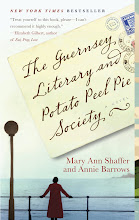I like this quote from Animal, Vegetable, Miracle, from a man who started "The Farmers Diner" in a small Vermont town. This diner only uses food from local farmers----a very incredible, hard-to-imagine concept. Here's something he says at one point:
"We have the illusion of consumer freedom, but we've sacrificed our community life for the pleasure of purchasing lots of cheap stuff. Making and moving all that stuff can be so destructive: child labor in foreign lands, acid rain in the Northeast, depleted farmland, communities where the big economic engine is crystal meth. We often have the form of liberty, but not the substance." He goes on to theorize that if every restaurant got only ten percent of its food from local farmers, "the infrastructure of corporate food would collapse."
This book has made me think about so many things I've taken for granted, so much I don't even consider in regards to the food I eat. Honestly, I've never really THOUGHT about the fact that if I'm getting grapes - or a watermelon - in January, then obviously it's from nowhere near me. That means it's not fresh, it used up a lot of oil getting to me, lots of people are possibly working for a big industrial farm making almost no money, and that I'm willing to continue to just want my food, and not care how it got to me. Barbara Kingsolver writes about a trip her family took into Canada -Montreal - and they explored "Petite Italie", where shops were lined up from every country you could think of. --- And she points out, as she's looking at big fish swimming in grocers' windows and whole chickens hanging in a spotlight, that Americans (the majority) prefer to not know (maybe "see" is the better word) the source of their food. "A sight like this on Main Street USA would send customers running the other way, possibly provoking lawsuits over pschological damage to children." And yet, when we continue to buy all of our produce from big grocery stores, when it's out of season or even when it's not, more and more small, local farmers (who are producing the real quality, not bred-out, bland stuff) are having to shut down. ---
I don't mean to be preachy or anything like that. I'm not even yet doing half of the "smart moves" in this book---It's hard to break long habits. I just find it all so interesting, and I like to share what I'm learning in case it interests anyone else. --
I hope you're having a happy Tuesday!
Monday, July 2, 2007
Subscribe to:
Post Comments (Atom)








3 comments:
it is so interesting and mainly why i've been buying as much locally produced food as i can ...
its going to be trickier in the winter for me though as snow drifts and frozen skies make it hard for us to have anything fresh that isn't brought from somewhere else ...
That book is next on my list.
This topic is one that has been on my mind a lot recently. I have been reading quite a bit about our "carbon footprint" and it makes me want to be very mindful of my own consumption, and how it affects my community and our earth. Some questions that I have to work through when buying groceries are; local or organic (if the product isn't both), which is "better?, organic watermelon or no watermelon? I think having fruit is necessary, even if it's not organic. If I can't get fresh spinach, should I buy frozen (even though freezing and transporting takes plenty of energy)?
It can really gnaw at you, but I'm glad I've been exposed to these concerns, and am doing what I can (even if it doesn't always feel like much).
Great post, Laura!
Post a Comment